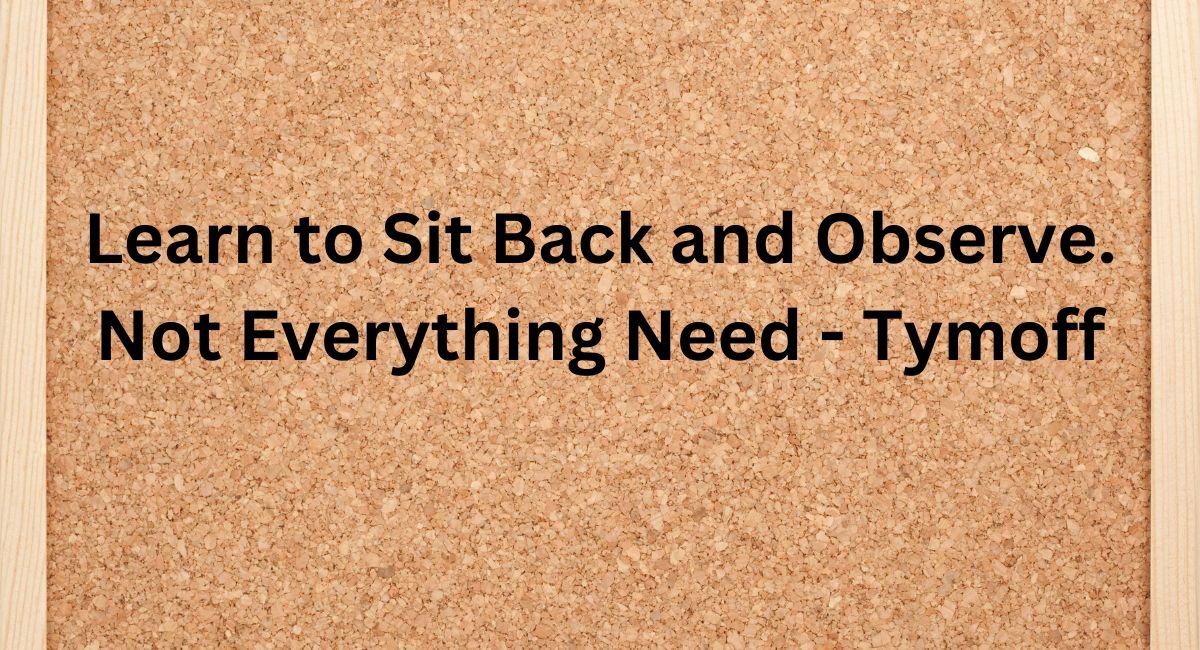
Learn to Sit Back and Observe. Not Everything Need – Tymoff
In a world that constantly demands our attention and engagement, the art of sitting back and observing can feel like a lost skill. But mastering this practice can lead to greater clarity, insight, and peace in our lives. Join us as we explore the power of observation and why not everything needs our immediate reaction in this insightful blog post by Learn to Sit Back and Observe. Not Everything Need – Tymoff. Let’s learn to slow down, take a step back, and see the world with fresh eyes.
Introduction to Learn to Sit Back and Observe. Not Everything Need – Tymoff
In today’s fast-paced world, we are constantly bombarded with information, tasks, and responsibilities. We are always on the go, trying to keep up with our busy schedules and meet deadlines. In such a hectic lifestyle, it is easy to get caught up in the chaos and lose sight of what really matters.
This is where the concept of sitting back and observing comes into play. It refers to taking a step back from our daily lives and simply observing our surroundings without any judgment or action. It may seem counterintuitive at first – after all, we are taught to always be proactive and take charge of our lives. However, sometimes taking a break from constant action can offer valuable insights that we may have otherwise missed.
Sitting back and observing allows us to disconnect from our thoughts, worries, and distractions. It creates space for us to gain perspective on our lives – both personal and professional. By doing so, we can uncover patterns or behaviors that may not be serving us well. We may also notice things that we have been overlooking or ignoring in the rush of everyday life.
Another crucial aspect of sitting back and observing is practicing mindfulness. Mindfulness means being fully present in the moment without any judgment or distraction. When we sit back and observe mindfully, we become aware of our thoughts, emotions, bodily sensations as well as our external environment. This heightened awareness enables us to make conscious decisions rather than reacting impulsively based on past conditioning.
Moreover, sitting back and observing also helps cultivate gratitude within ourselves. When we take a moment to reflect on everything around us – nature’s beauty, acts of kindness from others or even small moments of joy – it reminds us how much there is to appreciate in life.
Furthermore, this practice can also improve our relationships with others by promoting active listening skills. Often when engaging in conversations with loved ones or colleagues, we may find ourselves thinking about what to say next or judging their words. However, when we sit back and observe, we can truly listen to what the other person is saying without any preconceived notions. This can lead to more meaningful and authentic connections with those around us.
Sitting back and observing is a simple yet powerful concept that can improve our overall well-being. It allows us to gain clarity, improve our mindfulness, cultivate gratitude, and enhance our relationships. So take a moment each day to sit back, observe without judgment, and see how it positively impacts your life.
Read More: The 1982 Movie Poltergeist Used Real Skeletons As – Tymoff
The importance of avoiding unnecessary reactions
In today’s fast-paced world, it is easy to get caught up in the chaos and react impulsively without much thought. We are bombarded with constant information and stimuli that can trigger our emotions, leading us to respond in ways that may not be necessary or appropriate. This is where the importance of avoiding unnecessary reactions comes into play.
First and foremost, unnecessary reactions can often lead to negative consequences. When we act on impulse, we are not taking the time to assess the situation and consider all possible outcomes. This can result in saying or doing something that we may regret later on. It could damage relationships, create conflicts or even harm ourselves or others physically and emotionally. Therefore, by avoiding unnecessary reactions, we are preventing potential harm and maintaining a sense of control over our actions.
Moreover, constantly reacting without careful consideration can also make us appear impulsive and irrational to those around us. It sends a message that we lack self-control and maturity, which can affect how others perceive us both personally and professionally. In contrast, being able to sit back and observe shows a level of emotional intelligence and thoughtfulness that can garner respect from others.
Another reason why avoiding unnecessary reactions is crucial is for our own well-being. Reacting impulsively can be mentally draining as it requires a lot of energy to constantly be on high alert for triggers. It can also increase stress levels as we may find ourselves getting worked up over things that are not worth our time or energy. By learning to sit back and observe instead of reacting immediately, we are giving ourselves space to think rationally before responding in a calm manner.
Furthermore, practicing restraint when it comes to reacting unnecessarily allows us to gain better control over our emotions. Instead of letting external factors dictate how we feel or behave, we learn to take a step back and evaluate our feelings objectively before acting upon them. This helps us develop resilience against triggering situations as well as improve our ability to handle challenging emotions in a healthy and productive manner.
Avoiding unnecessary reactions is crucial for our own well-being, relationships with others, and overall personal growth. It allows us to take control of our emotions, make rational decisions, and maintain a sense of calmness in the midst of chaos. So the next time you feel yourself getting triggered, remember the importance of sitting back and observing instead of reacting impulsively.
Exploring the benefits of observing instead of reacting
When faced with a challenging situation or conflict, our natural instinct is often to react immediately. We may feel the need to defend ourselves, lash out in anger or frustration, or simply try to resolve the issue as quickly as possible. However, there is another approach that can be just as effective and even more beneficial in the long run – observing instead of reacting.
Observing involves taking a step back and pausing before responding. It allows us to take in all aspects of a situation without being clouded by immediate emotional reactions. By observing, we are able to gain a deeper understanding of the situation and those involved, which can lead to better decision-making and problem-solving.
One of the key benefits of observing instead of reacting is increased self-awareness. When we take the time to observe our thoughts and emotions before acting on them, we become more attuned to our patterns of behavior and triggers that may prompt us to react impulsively. This awareness enables us to have better control over our actions and make conscious choices rather than being driven by automatic responses.
Observing also allows us to see things from different perspectives. Often when we react immediately, it is based solely on our own viewpoint without considering others’ opinions or experiences. By stepping back and observing, we open ourselves up to new ideas and insights that can help us find common ground in conflicts or understand others’ motivations better.
Another significant benefit of observing instead of reacting is improved communication skills. When we react impulsively, there is a higher chance for miscommunication or misunderstandings because our emotions can cloud our ability to express ourselves clearly. However, by taking a moment to observe first, we give ourselves time to choose our words carefully and communicate effectively.
Moreover, observing helps us build patience and resilience in dealing with difficult situations. Reacting instantly may provide temporary relief but often leads to regret later on when emotions have subsided. On the other hand,’sitting back and observing can help us develop a more patient and resilient mindset, allowing us to handle conflicts and challenges with grace and composure.
Learning to sit back and observe instead of reacting is a valuable skill that can bring numerous benefits in our personal and professional lives. It allows us to cultivate self-awareness, see things from different perspectives, improve communication skills, and build patience and resilience. So the next time you are faced with a challenging situation, take a moment to observe before reacting – the results may surprise you.
Read More: It Is Not Wisdom But Authority That Makes A Law. T – Tymoff
Tips for Practicing the Art of Observation
Observation is a skill that allows us to gather information, learn from our surroundings, and make better decisions. It involves paying attention to details, people’s body language, and the environment around us. However, in today’s fast-paced world, we often find ourselves too occupied with our own thoughts and activities to take a moment to observe what’s happening around us.
Learning to sit back and observe can be challenging for some people, especially if they are used to being constantly busy. But with practice and dedication, anyone can develop their observational skills. Here are some tips that can help you become a better observer:
- Slow down and be present: The first step towards becoming a good observer is slowing down your pace of life. We tend to miss out on important details when we’re rushing through everything. Take time out of your day to just sit back and observe without any distractions or agenda.
- Use all your senses: Observation is not just about seeing; it also involves using all your senses – hearing, smelling, tasting, touching – to gather information about your surroundings. Pay attention to sounds or smells that you might have missed before.
- Notice body language: People’s nonverbal cues can tell you a lot about them and their emotions at the moment. Observe how someone stands or sits, their facial expressions, hand gestures – these subtle signals can give you valuable insights into their thoughts.
- Practice active listening: When having conversations with others, practice active listening by focusing on what they are saying rather than thinking about how you will respond next. This will allow you to pick up on more details in their words and tone.
- Avoid assumptions: Our brains tend to fill in gaps based on our preconceived notions about people or situations. To be an effective observer, it is important not to jump into conclusions or make assumptions based on limited information.
- Pay attention to your surroundings: Often, we are so focused on our destination that we miss out on the journey. Take a moment to observe and appreciate your surroundings – the colors, patterns, and small details that make up our environment.
- Practice regularly: Like any skill, observation requires practice to become second nature. Set aside some time every day to observe your surroundings without any distractions or judgment.
By following these tips and making observation a regular part of your life, you can enhance your understanding of people and situations, become more mindful, and ultimately make better decisions. Remember, not everything needs a reaction; sometimes all it takes is sitting back and observing with an open mind.
Real-life examples and experiences
Real-life examples and experiences are often the best way to learn and understand the importance of sitting back and observing. It is through these real-life situations that we can gain a deeper understanding of this concept and apply it in our own lives.
One common example is that of a student in a classroom setting. Many students tend to be eager to raise their hands and answer every question, wanting to prove themselves as knowledgeable or participative. However, those who sit back and observe their surroundings may notice that there are certain patterns or cues from the teacher indicating when it is appropriate to speak up. By paying attention and observing, these students can better gauge when it is appropriate to participate, improving their learning experience.
In the workplace, employees who take the time to observe their colleagues’ actions rather than jumping into every task often have a better understanding of the overall dynamics of their team. They can identify strengths and weaknesses within the group, allowing them to delegate tasks more effectively and create a more cohesive working environment.
Furthermore, sitting back and observing can also be beneficial in personal relationships. Often, we tend to jump into conflicts or conversations without taking the time to fully understand the other person’s perspective. By simply stepping back for a moment and observing their body language, tone of voice, or choice of words, we can gain valuable insight into what they truly mean or feel.
Another powerful example is that of successful entrepreneurs who credit much of their success to taking the time to observe market trends before making any major business decisions. By carefully studying consumer behavior and industry developments instead of impulsively jumping on every opportunity that presents itself, they are able to make well-informed decisions that lead them towards success.
On a more personal level, many individuals have experienced moments where they regret acting impulsively without taking the time to sit back and observe first. Whether it’s reacting angrily during an argument or making a hasty decision without considering all options, these instances serve as a reminder of the importance of taking a step back and observing before making any moves.
Real-life examples and experiences demonstrate how sitting back and observing can be beneficial in various aspects of our lives. It allows us to gain a better understanding of our surroundings, make more informed decisions, and ultimately lead to personal growth and success. So next time you find yourself in a situation where you feel the need to jump in immediately, remember the power of observation and take a moment to sit back and observe instead.
Read More: A True Relationship Is Two Imperfect People Refusi – Tymoff
How this practice can improve relationships and overall well-being
The practice of sitting back and observing can have a profound impact on our relationships and overall well-being. In today’s fast-paced world, we are constantly bombarded with stimuli and pressured to always be doing something. This can lead to feelings of burnout, stress, and disconnection from ourselves and those around us. By learning to sit back and observe, we give ourselves the opportunity to slow down, gain perspective, and improve our relationships.
One of the main ways this practice can enhance our relationships is by allowing us to listen more effectively. When we are caught up in our own thoughts and actions, it can be challenging to truly hear what others are saying. However, when we take a step back and actively listen without judgment or interruption, we develop a deeper understanding of those around us. This leads to stronger communication, empathy, and ultimately better relationships.
Additionally, sitting back and observing helps us become more aware of our own emotions and behaviors. Often times in relationships, conflicts arise due to misunderstandings or miscommunications stemming from our own triggers or reactions. When we take the time to observe ourselves in different situations without immediately reacting, we gain insight into how we may contribute to conflicts or tension within our relationships. This self-awareness allows for healthier responses rather than knee-jerk reactions that may harm a relationship.
Moreover, practicing observation also promotes mindfulness – the ability to be fully present in the moment without judgement or distraction. Mindfulness has been linked with improved mental health as it helps reduce stress levels and increase overall well-being. By being more present in our interactions with others through observation rather than constant action-taking or overthinking about the past or future, we cultivate deeper connections with others.
In addition to improving relationships with others, sitting back and observing also benefits our relationship with ourselves. It allows us to tune into our inner thoughts and feelings without trying to change them or push them away. Through this process of self-reflection, we can gain a better understanding of our needs, desires, and values. This self-awareness can lead to improved self-esteem and confidence, as well as a stronger sense of purpose and direction.
The practice of sitting back and observing is a powerful tool for improving relationships and overall well-being. It allows us to listen more effectively, become more aware of ourselves, be more mindful in our interactions with others, and cultivate a deeper connection with ourselves. So take some time each day to sit back and observe – you may be pleasantly surprised by the positive impact it has on your life.
Alternatives to Reacting: Mindfulness, Communication, etc.
In today’s fast-paced world, it’s easy to get caught up in the constant cycle of reacting to everything that happens around us. Whether it’s a stressful situation at work, an argument with a loved one, or even just a bad driver on the road, our natural instinct is often to react impulsively and without much thought. However, constantly living in reactive mode can be exhausting and detrimental to both our physical and mental well-being.
That’s where the concept of “sitting back and observing” comes in. Instead of immediately reacting to every situation that arises, we can learn to take a step back and observe before responding. This allows us to approach situations with more mindfulness and intentionality, leading to better outcomes and improved overall quality of life.
One key aspect of practicing this mindset is incorporating mindfulness techniques into our daily lives. Mindfulness involves being present in the moment without judgment or attachment. By staying mindful during challenging situations, we can observe our thoughts and emotions without getting carried away by them. This helps us maintain a sense of calmness and clarity, allowing us to respond from a place of awareness rather than reactivity.
Another essential component is communication – specifically effective communication skills. Often when we react impulsively, we may say things we don’t truly mean or communicate in ways that are hurtful or unproductive. By taking a step back and observing first, we can then communicate more mindfully by choosing our words carefully and actively listening instead of just reacting out of emotion.
It’s also important to recognize that not everything needs a reaction from us. Sometimes situations may arise that are entirely out of our control or insignificant in the grand scheme of things. In these instances, learning how to let go rather than reacting can save us time and energy while maintaining our inner peace.
Practicing gratitude is another powerful tool for learning how to sit back and observe instead of always reacting. By focusing on what we are thankful for in our lives, we can shift our mindset from constantly seeking out problems to appreciating the blessings around us. This helps us maintain a more positive outlook and reduce our tendencies towards reactive behavior.
Learning to sit back and observe instead of reacting impulsively can greatly improve our overall well-being. By incorporating mindfulness, effective communication, letting go, and gratitude into our lives, we can develop a more intentional and peaceful approach to handling life’s challenges. So next time you find yourself tempted to react immediately, take a deep breath, sit back and observe – you may be surprised at how much better things turn out.
Conclusion: Learn to Sit Back and Observe. Not Everything Need – Tymoff
In today’s fast-paced world, it can be easy to get caught up in the hustle and bustle of everyday life. We are constantly bombarded with information, distractions, and the need to constantly be on the move. However, amidst all this chaos, it is important to take a step back and learn how to sit back and observe.
The art of sitting back and observing involves taking a pause from our busy lives and simply being present in the moment. It means slowing down our thoughts and actions, and instead focusing on what is happening around us. This practice allows us to gain a new perspective on things, make better decisions, and feel more grounded.
One of the main reasons why learning to sit back and observe is crucial in today’s society is because it helps us avoid burnout. With so much going on in our lives, it can be easy for us to become overwhelmed and exhausted. By taking time out of our day to simply sit back and observe, we give ourselves a chance to recharge mentally and emotionally. This allows us to come back stronger and more focused than before.
In addition, sitting back and observing also helps improve our relationships with others. In a world where communication is often done through screens rather than face-to-face interactions, we tend to miss out on non-verbal cues that play an important role in understanding one another. By practicing observation skills, we become more attuned to these cues during conversations with others which can lead to better communication and deeper connections.
Furthermore, sitting back and observing also encourages mindfulness – the practice of being fully present in the moment without judgment or distraction. Mindfulness has been proven to reduce stress levels, improve mental clarity, enhance self-awareness, boost creativity,and increase overall well-being.
Another benefit of learning how to sit backand observeis that it allows us time for reflection. In today’s society where everything moves at lightning speed,it can be easy for us to get caught up in the constant cycle of doing without taking time to reflect on our actions. By observing, we create space for introspection and self-evaluation, which can lead to personal growth and development.
Learning how to sit back and observe is a crucial skill that we all need in today’s fast-paced world. By doing so, we can avoid burnout, improve relationships with others, cultivate mindfulness, and make better decisions. So take some time out of your day to simply sit back and observe – you may be surprised at what you discover.



